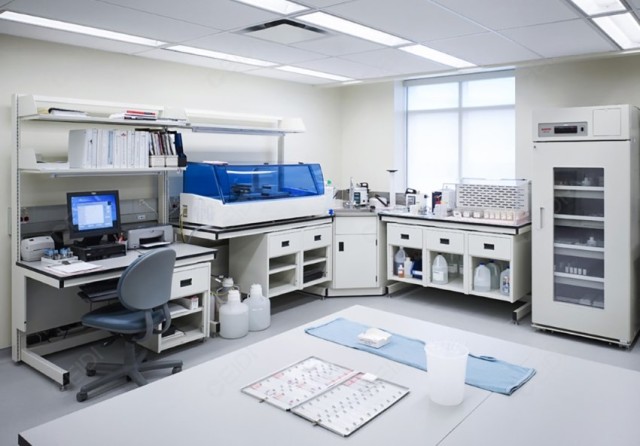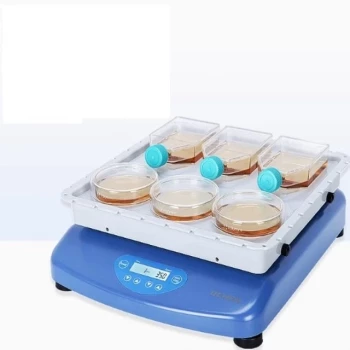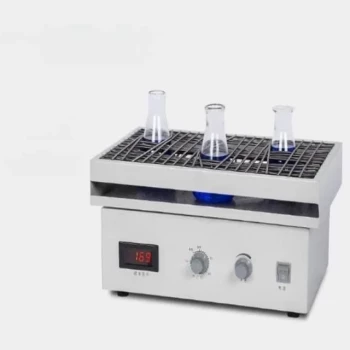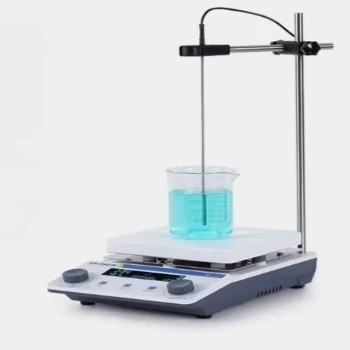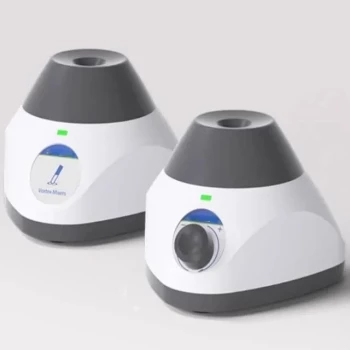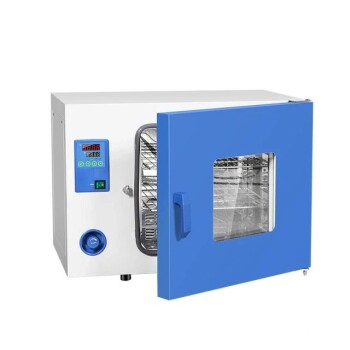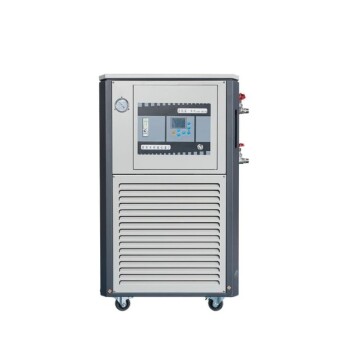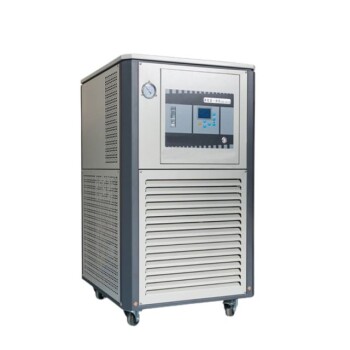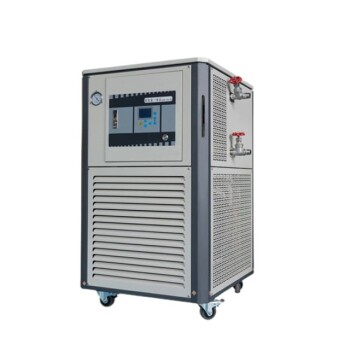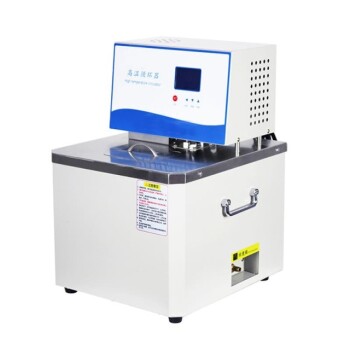Incubateurs à température contrôlée
Incubateur biochimique
L'incubateur biochimique est équipé d'un système sophistiqué de contrôle de la température à deux voies, permettant à la fois la réfrigération et le chauffage. Cette double fonctionnalité assure une régulation précise de la température, ce qui est crucial pour diverses applications de laboratoire. La fonction de régulation de la température de l'incubateur lui permet de maintenir des conditions constantes, ce qui le rend indispensable pour les tests à température constante à basse température, les tests de culture et les tests environnementaux.

Dans les tests à température constante basse, l'incubateur biochimique garantit que les échantillons restent à une température stable et prédéterminée, ce qui est essentiel pour une collecte et une analyse précises des données. Pour les tests de culture, l'incubateur fournit un environnement optimal pour la croissance et la prolifération des micro-organismes, ce qui facilite les études détaillées de leur comportement et de leurs caractéristiques. En outre, dans les tests environnementaux, l'incubateur simule diverses conditions environnementales, aidant les chercheurs à comprendre comment différents facteurs affectent les processus biologiques.
La polyvalence de l'incubateur biochimique est encore soulignée par son application dans un large éventail de disciplines scientifiques, notamment la microbiologie, la biochimie et les sciences de l'environnement. Sa conception robuste et ses mécanismes de contrôle précis en font un outil essentiel pour la recherche universitaire et industrielle.
Incubateur à moisissures
Les incubateurs à moisissures sont des appareils de laboratoire spécialisés conçus pour favoriser la croissance des organismes et des plantes en contrôlant méticuleusement les conditions environnementales dans un espace fermé. Ces incubateurs sont essentiels pour diverses applications de recherche biologique et microbiologique, où un contrôle précis de la température et de l'humidité est crucial.

Pour favoriser des conditions de croissance optimales, les incubateurs à moisissures sont équipés de systèmes avancés qui permettent de régler avec précision les niveaux de température et d'humidité. Cette précision est essentielle pour garantir que les cultures de moisissures se développent dans un délai relativement court, généralement compris entre 4 et 6 heures. La possibilité de définir et de maintenir ces conditions spécifiques permet non seulement d'accélérer le processus de croissance, mais aussi de garantir l'uniformité et la cohérence des résultats expérimentaux.
En outre, l'environnement fermé fourni par les incubateurs de moisissures aide à prévenir la contamination par des facteurs externes, ce qui est primordial pour maintenir l'intégrité des données de recherche. Cet environnement contrôlé est particulièrement avantageux pour les études portant sur des organismes sensibles ou nécessitant un environnement stérile.
En résumé, les incubateurs à moisissures sont des outils indispensables au laboratoire, car ils offrent un moyen fiable et efficace de cultiver des organismes et des plantes dans des conditions précisément contrôlées, ce qui permet de soutenir un large éventail de recherches scientifiques.
Incubateur à dioxyde de carbone
L'incubateur à dioxyde de carbone est un appareil de laboratoire avancé spécialement conçu pour la culture in vitro de cellules et de tissus. Il reproduit méticuleusement l'environnement naturel de croissance des cellules/tissus à l'intérieur des organismes, facilitant ainsi les conditions optimales pour leur prolifération et leur étude.

Cet incubateur spécialisé maintient une atmosphère contrôlée qui comprend non seulement des niveaux précis de température et d'humidité, mais aussi une concentration régulée de CO2. Cela est essentiel pour maintenir l'équilibre du pH nécessaire à la viabilité et à la croissance des cellules. L'appareil est équipé de capteurs et de systèmes de contrôle sophistiqués qui garantissent que ces paramètres restent stables et se situent dans la plage optimale pour le type spécifique de cellule ou de tissu cultivé.
En outre, l'incubateur à dioxyde de carbone est souvent utilisé avec d'autres équipements de laboratoire pour créer un système complet pour la recherche biologique. Par exemple, il peut être intégré à des systèmes d'alimentation automatisés, à des technologies d'imagerie et à des outils d'enregistrement des données afin de fournir une approche holistique des études de culture cellulaire. Cette intégration permet non seulement d'améliorer l'efficacité du processus de recherche, mais aussi de garantir la précision et la fiabilité des résultats expérimentaux.
En résumé, l'incubateur à dioxyde de carbone s'impose comme un outil essentiel dans l'arsenal des équipements de laboratoire, offrant une précision et un contrôle inégalés pour la culture in vitro de cellules et de tissus. Sa capacité à simuler les conditions complexes d'un organisme vivant le rend indispensable aux chercheurs dans des domaines tels que la biotechnologie, la pharmacologie et la médecine régénérative.
Incubateur électrique à température constante
L'incubateur électrique à température constante est une pierre angulaire dans le domaine de la recherche scientifique et de la production industrielle, en particulier dans les secteurs de la médecine et de la santé, des produits pharmaceutiques, de la biochimie et de l'agriculture. Cet équipement polyvalent est méticuleusement conçu pour faciliter la culture bactérienne, la fermentation et les tests à température constante, en garantissant des conditions environnementales précises qui sont essentielles pour la culture et l'analyse réussies de diverses entités biologiques.

Dans le secteur de la médecine et de la santé, l'incubateur électrique à température constante joue un rôle essentiel dans la croissance et l'entretien des cultures bactériennes, qui sont indispensables pour les tests de diagnostic et la mise au point de vaccins. De même, dans l'industrie pharmaceutique, il facilite les processus de fermentation nécessaires à la production d'antibiotiques et d'autres composés médicinaux. Les domaines de la biochimie et de l'agronomie bénéficient également de sa capacité à maintenir des températures stables, ce qui permet d'obtenir des résultats expérimentaux cohérents et fiables.
L'incubateur électrique à température constante n'est pas simplement un récipient passif pour les échantillons biologiques ; il participe activement au processus scientifique, en veillant à ce que les conditions à l'intérieur soient parfaitement adaptées aux besoins des organismes étudiés. Cette précision est obtenue grâce à des mécanismes avancés de contrôle de la température, qui permettent de maintenir un environnement constant indépendamment des fluctuations externes, améliorant ainsi la reproductibilité et la fiabilité des résultats expérimentaux.
De plus, son application s'étend au-delà du simple maintien de la température ; il répond également à une variété de besoins d'incubation spécialisés, tels que ceux impliquant la lumière, l'humidité et même des environnements de gaz contrôlés. Cette adaptabilité fait de l'incubateur électrique à température constante un outil inestimable dans les laboratoires modernes, où la demande de résultats précis et cohérents est primordiale.
Incubateurs spécialisés
Incubateur à lumière
L'incubateur à lumière est un équipement de laboratoire spécialisé conçu pour la culture et l'élevage d'un large éventail de micro-organismes, y compris les bactéries et les moisissures. Contrairement aux autres incubateurs qui reposent souvent uniquement sur le contrôle de la température, l'incubateur à lumière intègre à la fois le contrôle de la température et de la lumière, offrant ainsi un environnement plus complet pour la croissance microbienne.

La cuve intérieure d'un incubateur à lumière est généralement fabriquée en plastique technique ou en acier inoxydable. Ce choix de matériaux est crucial pour plusieurs raisons :
-
Plastique technique: Il offre une excellente résistance chimique, ce qui le rend idéal pour contenir diverses cultures microbiennes sans risque de réactions chimiques. Il offre également une surface lisse facile à nettoyer et à entretenir, ce qui est essentiel pour éviter la contamination croisée entre les cultures.
-
Acier inoxydable: Connu pour sa durabilité et sa résistance à la corrosion, l'acier inoxydable permet à l'incubateur de résister aux rigueurs d'une utilisation fréquente en laboratoire. Il facilite également la distribution efficace de la chaleur, ce qui est essentiel pour maintenir des températures constantes dans l'incubateur.
Ces matériaux assurent non seulement la longévité et la fonctionnalité de l'incubateur, mais contribuent également à la stérilité et à l'efficacité globales du processus de culture.
Chambre climatique artificielle
La chambre climatique artificielle est un outil de laboratoire polyvalent qui facilite un large éventail d'études biologiques et environnementales. Ses principales applications sont les suivantes la germination et la culture de semis Elle offre des conditions contrôlées qui imitent les environnements de croissance naturels, améliorant ainsi le taux de réussite de la propagation des plantes. En outre, la chambre joue un rôle important dans la culture de tissus et de micro-organismes Elle offre un environnement stable et stérile qui favorise la croissance de divers spécimens biologiques.

Pour les chercheurs qui étudient les insectes et les petits animaux la chambre climatique artificielle offre un habitat contrôlé qui peut simuler différentes conditions climatiques, facilitant l'observation et l'analyse des réponses comportementales et physiologiques. Cette capacité s'étend à l'analyse de l'eau La chambre est utilisée pour déterminer la demande biochimique en oxygène (DBO), un paramètre essentiel dans l'évaluation de la qualité de l'eau.
Au-delà de ces utilisations spécifiques, la chambre à climat artificiel est employée dans les cas suivants les essais généraux de climat artificiel où elle reproduit diverses conditions environnementales afin d'évaluer la performance et la durabilité des matériaux, des produits et des systèmes dans différents scénarios climatiques. Cette large applicabilité en fait un atout indispensable pour la recherche universitaire et les applications industrielles.
Chambre à température et humidité constantes
L'enceinte d'essai à température et humidité constantes est un outil indispensable à la science et à l'ingénierie des matériaux, conçu pour simuler un large éventail de conditions environnementales. Cette chambre permet aux chercheurs d'évaluer les performances des matériaux dans différentes conditions de température et d'humidité, testant ainsi leur résistance à des conditions telles que la chaleur, le froid, la sécheresse et l'humidité.

En soumettant les matériaux à des contraintes environnementales contrôlées, les scientifiques peuvent prédire leur comportement dans des scénarios réels, ce qui est crucial pour des industries allant de l'automobile à l'aérospatiale. Par exemple, un matériau qui fonctionne bien dans des conditions de chaleur et d'humidité extrêmes en laboratoire a plus de chances de conserver son intégrité dans des climats tropicaux ou lors d'une exposition prolongée à la lumière directe du soleil.
La polyvalence de la chambre à température et humidité constantes ne se limite pas aux essais de matériaux. Elle est également utilisée dans la recherche biologique, où elle peut simuler les conditions environnementales nécessaires à la croissance et à l'étude des micro-organismes, des plantes et d'autres spécimens biologiques. Cette capacité en fait un atout précieux dans des domaines tels que l'agriculture, les produits pharmaceutiques et les sciences de l'environnement.
En résumé, l'enceinte d'essai à température et humidité constantes n'est pas un simple équipement, c'est un outil sophistiqué qui facilite les activités de recherche et de développement dans de nombreuses disciplines scientifiques.
Incubateur microbien
L'incubateur microbien est un appareil spécialisé, de type boîte, conçu pour cultiver un large éventail de micro-organismes, notamment des bactéries, des moisissures et des cellules végétales ou animales. Cet outil polyvalent est essentiel dans la recherche biologique pour simuler les conditions de croissance optimales requises par ces organismes.

Les paramètres environnementaux clés tels que la température, l'humidité, la lumière, les niveaux de dioxyde de carbone et le pH sont méticuleusement contrôlés à l'intérieur de l'incubateur. Cette régulation précise garantit que l'environnement interne imite les habitats naturels des organismes étudiés, favorisant ainsi leur croissance et leur reproduction. Par exemple, les bactéries se développent généralement dans des environnements chauds et humides, tandis que les moisissures peuvent nécessiter des niveaux d'humidité et des conditions de lumière spécifiques pour proliférer.
La capacité de l'incubateur microbien à maintenir un environnement stable et contrôlé est cruciale pour les expériences qui nécessitent des résultats cohérents. Qu'il s'agisse d'étudier les effets de la température sur la croissance bactérienne ou l'impact des niveaux de dioxyde de carbone sur les cultures de cellules végétales, l'incubateur constitue une plate-forme fiable pour de telles recherches.
En résumé, l'incubateur microbien est la pierre angulaire des laboratoires, car il offre aux chercheurs les moyens de cultiver et d'étudier un large éventail de micro-organismes dans des conditions précisément contrôlées.
Incubateur anaérobie
L'incubateur anaérobie est spécialement conçu pour la culture d'organismes anaérobies, c'est-à-dire de micro-organismes qui se développent dans des environnements dépourvus d'oxygène. Ces incubateurs créent un environnement contrôlé, sans oxygène, en éliminant ou en réduisant systématiquement les niveaux d'oxygène dans la chambre. Pour ce faire, différentes méthodes sont utilisées, comme l'utilisation de mélanges gazeux qui excluent l'oxygène ou l'utilisation de systèmes de vide pour éliminer l'oxygène de la chambre.

Ces incubateurs offrent non seulement des conditions anaérobies strictes, mais maintiennent également une température constante, ce qui est crucial pour la croissance et la survie des organismes anaérobies. Le système de contrôle de la température garantit que l'environnement interne reste stable, imitant les habitats naturels de ces organismes. Cette double fonctionnalité - conditions anaérobies et température constante - rend les incubateurs anaérobies indispensables dans les laboratoires où l'étude des bactéries anaérobies et d'autres micro-organismes est une priorité.
La conception d'un incubateur anaérobie est à la fois systématique et scientifique, avec une zone de travail bien organisée qui permet un contrôle et une surveillance précis des conditions à l'intérieur de la chambre. Des capteurs et des systèmes de contrôle avancés surveillent et ajustent en permanence les niveaux d'oxygène et de température, garantissant ainsi que les conditions restent optimales pour les organismes cultivés. L'agencement systématique facilite également l'utilisation, permettant aux chercheurs de réaliser leurs expériences efficacement et en perturbant le moins possible le délicat environnement anaérobie.
Incubateur oscillant
Un incubateur oscillant est un équipement de laboratoire spécialisé conçu pour la culture d'échantillons biologiques. Contrairement aux incubateurs traditionnels qui maintiennent un environnement statique, les incubateurs oscillants intègrent un léger mouvement de bascule pour simuler les conditions naturelles, comme le mouvement de l'eau dans un habitat naturel. Ce mouvement est crucial pour la croissance et le développement de certains types de cellules, en particulier celles qui ont besoin d'agitation pour faciliter la distribution des nutriments et l'élimination des déchets.

La fonction première d'un incubateur oscillant est de fournir un environnement contrôlé qui favorise la croissance des échantillons biologiques. Il s'agit notamment de maintenir des niveaux précis de température, d'humidité et de CO2, qui sont essentiels à la viabilité et à la prolifération des cellules. La fonction d'oscillation ajoute un niveau de complexité supplémentaire au processus d'incubation, en garantissant que les échantillons sont non seulement maintenus dans des conditions optimales, mais aussi soumis à un mouvement doux et régulier.
Les incubateurs oscillants sont particulièrement utiles dans des domaines tels que la microbiologie, la biologie cellulaire et la biotechnologie. Ils sont souvent utilisés pour la culture de bactéries, de champignons et d'autres micro-organismes qui bénéficient d'un environnement dynamique ou qui en ont besoin. La possibilité de contrôler la fréquence et l'amplitude de l'oscillation permet aux chercheurs d'adapter les conditions d'incubation aux besoins spécifiques de leurs échantillons, améliorant ainsi la précision et la fiabilité de leurs expériences.
En résumé, un incubateur oscillant n'est pas un simple fournisseur d'environnement statique, mais un système dynamique qui simule les conditions naturelles pour favoriser la croissance des échantillons biologiques. Ses caractéristiques uniques en font un outil indispensable dans divers environnements de laboratoire, en particulier lorsque l'interaction entre les cellules et leur environnement joue un rôle essentiel dans les résultats de la recherche.
Produits associés
- Agitateur orbital oscillant de laboratoire
- Agitateur mécanique horizontal de laboratoire multifonctionnel à petite vitesse réglable pour laboratoire
- Agitateur chauffant magnétique à température constante de petite taille pour laboratoire
- Mélangeur rotatif à disque de laboratoire pour un mélange et une homogénéisation efficaces des échantillons
- Autoclave à vapeur haute pression de laboratoire vertical pour service de laboratoire
Articles associés
- Comprendre le pressage isostatique : Processus, avantages, limites et applications
- Procédés de production des barreaux en céramique de zircone : Pressage isostatique et pressage à sec
- Qu'est-ce qu'une machine de pressage isostatique
- L'art de l'arrêt : Ingénierie de la fiabilité dans les cellules électrochimiques
- Équipement de base pour centrifugeuse de laboratoire
